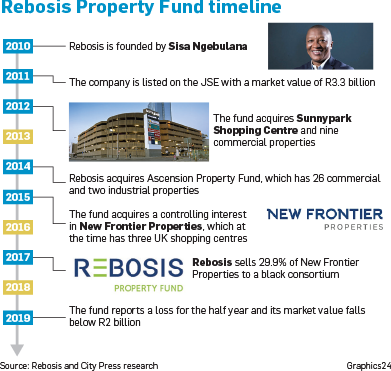
Just five years ago Rebosis Property Fund and its founder Sisa Ngebulana were unstoppable.
The fund was one of the most exciting players in the property market and the share price was reflecting this. It was snapping up lucrative properties around the country and turning them into gems and, at the same time, building new ones.
It counted signature malls among its prized assets.
Ngebulana was seen as one of the most dynamic, risk-taking entrepreneurs in the sector.
An ambitious expansion project was under way in several countries.
However, last week the Rebosis share price fell very close to an all-time low as investment in UK property fund New Frontier Properties (NFP) – which was part of the aggressive expansion plan – came unstuck.
The company’s multibillion-rand debt load has become a depressing weight on the company and Ngebulana and his team were being forced into a fire-sale of properties to reduce its debt.
From an all-time high of about R14.20 share in May 2013, Rebosis was on Friday quoted at R1.15 a drop of 92%.
As a result of the write down, Rebosis halted its interim dividend to its shareholders but still plans to pay a full-year dividend this year.
Investors view dividends as important – so halting the payment of this income happens only when a company experiences a major downturn or a crisis.
Overall the company reported a loss for the half year of R2 billion. Net debt stood at more than R10 billion for a company with about R17.6 billion in assets at the end of February. It now has a market value of less than R2 billion.
NFP has three retail properties in the UK and European logistics and warehouse assets in Ireland.
Ngebulana is chairperson of NFP, which is listed on the JSE and on the Mauritius stock exchange.
NFP had been hit by the weak UK economy, especially the uncertainty about Brexit negotiations.
This had seen a lot of shopping centre tenants, including retailers and fast-food chains, reduce rents and close stores across the UK.
Evan Robins, an Old Mutual property analyst, said that Rebosis’ acquisition of a controlling stake in NFP in 2015 was generally viewed as a “bad deal” that had come unstuck because of the double whammy of NFP accumulating too much debt and the poor economic conditions in the UK that had hurt its retail assets.
Investors had viewed Rebosis’ move to acquire a stake in NFP as unwise because the fund’s assets didn’t inspire confidence and the price paid for the acquisition was viewed as too steep. This view had ultimately been borne out by the recent write down of value of Rebosis’ stake in NFP.
Lawrence Koikoi, a Stanlib property analyst, said the downfall of Rebosis’ NFP investment, due to a weak UK economy, was the biggest reason for the collapse in Rebosis’ share price.
To plug its net debt of more than R10 billion, Rebosis started to sell a number of properties in May last year.
Rebosis hopes to secure R7.9 billion from these disposals.
Some of these transactions involved Rebosis selling the Mdantsane City Shopping Centre, which is the second-largest shopping centre in the Eastern Cape, the Sunnypark Shopping Centre in Pretoria and the Bloedstreet Mall to Vukile Property Fund for R1.8 billion.
In May last year Rebosis sold six Cape Town office properties for a total of R888 million to Boxwood Property Investment Funds.
In February Rebosis announced it would sell its Salu Building in Pretoria to Narefin for R695 million and its Bank of Lisbon Building in Pretoria to Naravax for R202 million.
Also in February, Rebosis agreed to sell seven office buildings to Fortune Capital.
In an investor presentation last week Rebosis listed another R3.7 billion in retail properties it planned to sell.
Old Mutual’s Robins said that Rebosis was effectively selling “some of its best assets” to Vukile Property in a “fire sale” to try to reduce its debt swiftly.
After this sale, Rebosis would be left with “risky” and less attractive property assets, Robins said. “It is a very sad story.”
On the bright side, he said that if Rebosis, after the sale of the assets was done, righted itself, then the prevailing Rebosis share price offer would be good value.
Another factor that had put pressure on Rebosis’ share price and confidence in the fund was the sudden change in the company’s executive.
In June 2017 Ngebulana announced he would leave his CEO role at Rebosis to devote more attention to other businesses with his Billion Group, the holding company.
He was replaced by Rebosis board member Andile Mazwai who was handpicked by Ngebulana for the CEO job.
Ngebulana and the board believed that because of Mazwai’s familiarity with the company and its strategies the transition would be seamless.
It was not to be.
Mazwai wanted to change the company’s direction so that it would own higher-quality offices, retail and take over Texton Property Fund but this was very different from Ngebulana’s strategy of becoming a retail-focused fund, according to SA Commercial Property News.
Mazwai’s tenure suddenly ended when he resigned with immediate effect for “personal reasons” in April last year.
Ngebulana returned to the helm a few weeks later.
The story behind Rebosis starts with Ngebulana, who is a self-made billionaire.
He listed Rebosis on the JSE in May 2011.
It was the largest initial public offering in the property sector at the time and the first black-owned company in the property sector.
In 2016 Rebosis’ assets were worth R18 billion.
Ngebulana was trained as a lawyer. He turned to property 17 years ago.
Before he started Rebosis he had tried various sideline businesses, including furniture removals, renovating and selling property, investing in a coal company and building residential property.
Ngebulana acknowledged to City Press in an interview in 2016 that he, like any entrepreneur, had suffered failures, missteps and lessons in his early business ventures but he said that these challenges had made him stronger and his hard work ethic in establishing his property business made all the difference.
He had his first taste of the property business when he was at university when he wrote and passed the estate agency exam.
He then registered with a local estate agency and started to sell and renovate homes.
He joined Eskom’s legal department and, to supplement his income, he bought empty plots in Kyalami Estates and built houses on them.
He later worked on cluster developments in Hyde Park, Bryanston, Dainfern and Pecanwood in Hartbeespoort.
He branched into commercial property and then into building malls and shopping centres, especially those close to townships and rural areas.
Then, in 2010, he set up Rebosis Property Fund.
Ngebulana pointed out in the City Press interview is that the sector was not transformed and black property companies were heavily discounted in the market, something that he hoped Rebosis would contribute to changing.
“It is one sector where transformation doesn’t matter. Some of the guys have done BEE transactions. It is still hard – with the greatest respect – for the sector to accept a company like mine as an equal.
“We get resistance everywhere with everything we do. We get bad-mouthed … I don’t live relying on transformation. I do my own thing,” he said.
 |
| ||||||||||||
| |||||||||||||




 Publications
Publications
 Partners
Partners









